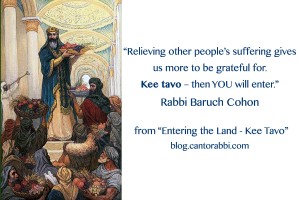ENTERING THE LAND – Kee Tavo – Deut. 26.1—29.8, by Rabbi Baruch Cohon
This week’s reading continues Moses’ farewell addresses to the people on the east bank of the Jordan. Included, along with a review of other commandments, is the dramatic description of six tribes standing on each of two facing mountains enunciating a series of blessings and curses. The blessings are promises of rewards earned by following Divine guidelines and the curses detail tragic destruction as results of violating them. The famous tokhakha, as the fearful curses are called, is aptly described as second only to the actual suffering recorded in Jewish history.
At the beginning of this portion, however, we read of an offering which may seem odd to lead off with. It concerns bringing the first fruits of the harvest to the Temple as an offering. It says: “When you enter the land that G-d gives you to inherit, and you take possession and dwell there, take some of the first fruits of the earth that you take out of the land G-d gives you, and put it in a basket. Go to the place that G-d will choose for the Divine presence to dwell there, and bring the basket to the priest…” Wait, there’s more. The Torah gives the farmer a whole speech to say when delivering the fruit – which of course was limited to the crops native to the Land of Israel: wheat, barley, grapes, figs, pomegranates, olive oil and honey. The farmer then reviews ancestral history from Egypt on, culminating in acquiring “this land, a land flowing with milk and honey. And now, look, I brought the first fruit of this land that You, G-d, gave me.” To which the Torah adds: “Rejoice in all the good that G-d gave you and your family – you, and the Levite, and the stranger in your midst.” It is not enough to enjoy the bounty of the earth yourself, you must share it with those who do not have property of their own.
Note the words “take possession and dwell there.” Quoting the Talmud (in Tractate Kiddushin), Rashi notes that this commandment did not take effect until the people had conquered the land and divided it into family plots. To which the Klee Yokor commentary adds the fact that this is one of just two places where these terms “take possession and dwell there” occurs. Once they have possession and residence, Israel could “get fat and start kicking” as the prophet says, seeking areas of rulership like other nations. So this process of First Fruits has the purpose of bringing down the haughty attitude that could come with possession and residence, as if to say that this land is theirs because they acquired it with the sword, forgetting G-d. Just as the courage to conquer had a Divine source, so the blessing of residence involves responsibility – to carry out the Mitzvos.
In fact, responsibility is the one condition that emerges from this whole discussion. The very opening sentence “When you enter the land” is phrased in the singular, treating the entire Israelite nation as an individual. And indeed, until the entire population was in the land, no Bikkurim – no First Fruit ceremony could take place. If even one Jew still remained outside, this national expression of gratitude for a homeland had to wait. The Lubavitcher Rebbe applies that example to today: “As long as there is a single Jew who is materially or spiritually deprived, the rest of us cannot experience complete joy. The plight of our fellow Jews – and through them the plight of all humanity and creation in general – should inspire us to action to remedy this situation.” Relieving other people’s suffering gives us more to be grateful for. Kee tavo – then YOU will enter. Something to think about this week.



